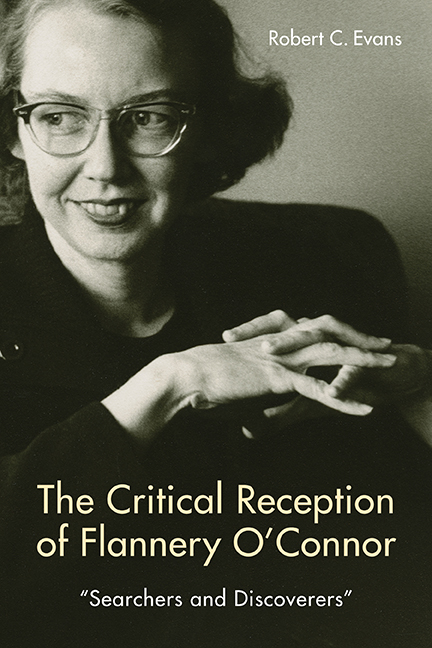Book contents
- Frontmatter
- Dedication
- Epigraph
- Contents
- Acknowledgments
- Introduction
- 1 Aesthetics: Style, Form, Themes, and Characterization
- 2 Religion: Christianity and Catholicism
- 3 History and Historical Contexts
- 4 The South: Heritage and Change
- 5 Race: Blacks and Whites
- 6 Gender: Women and Men
- Conclusion: O'Connor Criticism: What Now? What Next?
- Works Cited
- Index
Conclusion: O'Connor Criticism: What Now? What Next?
Published online by Cambridge University Press: 15 August 2018
- Frontmatter
- Dedication
- Epigraph
- Contents
- Acknowledgments
- Introduction
- 1 Aesthetics: Style, Form, Themes, and Characterization
- 2 Religion: Christianity and Catholicism
- 3 History and Historical Contexts
- 4 The South: Heritage and Change
- 5 Race: Blacks and Whites
- 6 Gender: Women and Men
- Conclusion: O'Connor Criticism: What Now? What Next?
- Works Cited
- Index
Summary
IF THERE IS A CURRENT NEED for O'Connor scholarship to pursue, it may be a need for consolidation and coordination of all the fine work that has already been done on O'Connor's writings. This book is, I hope, a contribution toward such a project. Also valuable, however, would be an ongoing, online “variorum” edition of O'Connor's works. I do not mean a simple listing of textual variants but rather a “variorum” in the sense pioneered by Howard Furness in his early “variorum” Shakespeare editions, a project now being sponsored, in a series of new editions, by the Modern Language Association. An even better example of the sort of thing I have in mind is the splendid and incomparable Variorum Edition of the Poetry of John Donne, which would be an ideal model for such an undertaking.
Such an edition, which would be much easier to prepare and sustain online than on paper, would eliminate the need for readers to wade through all the lengthy plot summaries that necessarily take up so much space in so many individual books and articles on O'Connor. Like the Donne Variorum, such an edition would emphasize instead the many particular responses to specific words, sentences, paragraphs, characters, themes, historical allusions, and so on in O'Connor's writings. Like the Donne Variorum, an O'Connor variorum would instantly put at one's finger tips (or on one's computer screen) practically every point that has ever been made about O'Connor, down to the smallest details. An O'Connor variorum edition would help eliminate the tendency for some points to be made over and over again, as is so common in literary scholarship in general. (In fact, ideally there would be variorum editions, in the sense described here, for every “major” author.) Readers could quickly see what points had already been made, and sometimes made repeatedly, and thus need not be made again. Readers would also get a strong sense of areas of consensus, just as they would also be able to see which arguments have been truly innovative, unconventional, controversial, or implausible. They would, of course, also get a clear view of omissions or under-studied topics. And they would be inspired to dig into some of the overlooked nitty-gritty details of texts rather than repeating thematic generalizations that had already been made repeatedly.
- Type
- Chapter
- Information
- The Critical Reception of Flannery O'Connor, 1952–2017“Searchers and Discoverers”, pp. 233 - 236Publisher: Boydell & BrewerPrint publication year: 2018



